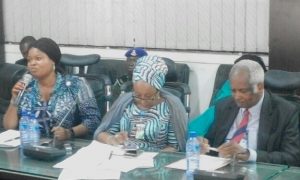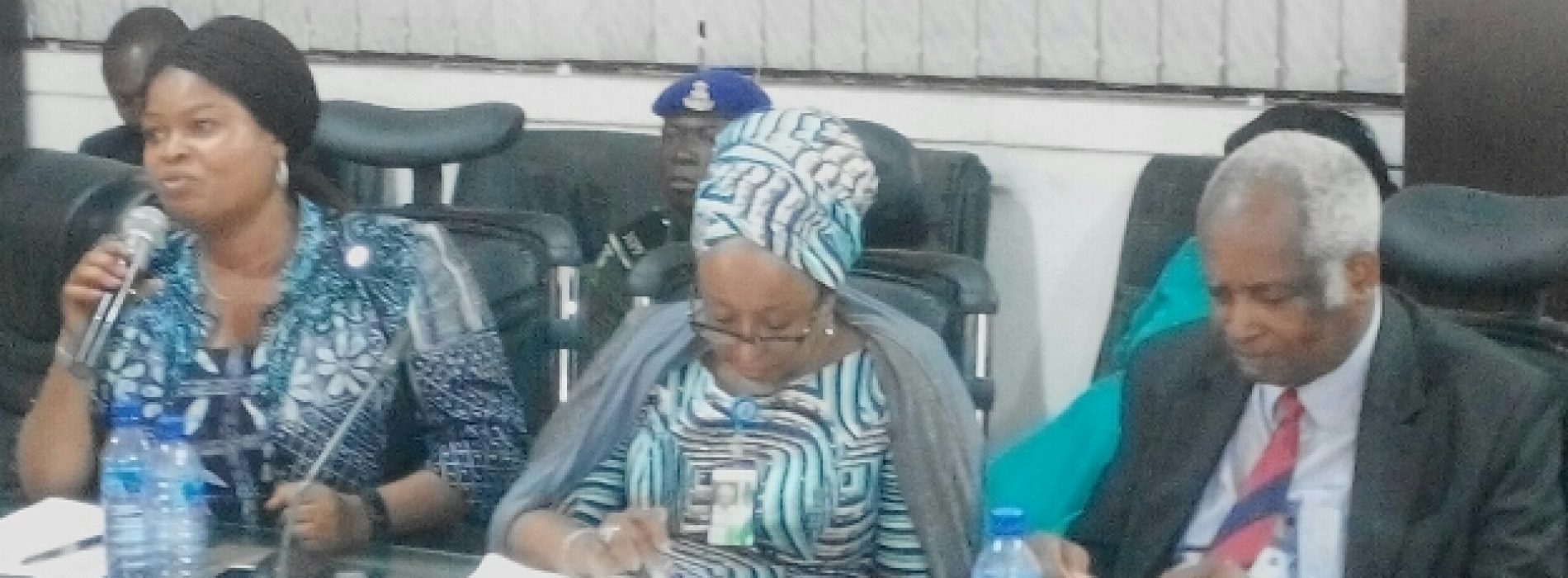FG considers pruning hospital bills, other measures to reduce maternal deaths
● Sets up Task Force

Founder and President, Association for Family and Reproductive Health (ARFH) Prof. Oladapo Ladipo (right) and other members of the new committee.
The Federal Goveenment is considering a reduction of bills in public hospitals and the re-introduction of conditional cash transfer for women who access health facilities for ante-natal, as measures to drastically bring down high maternal mortality in the country, the Minister of Health, Prof. Adewole, announced Tuesday.
According to the minister, the government is also working towards improving human resources and public health infrastructures across the country.
Adewole said while inaugurating a task force on “Accelerated Reduction of Maternity” in the country in Abuja that with the efforts of the task force, government would ensure high mortalities of mothers in six states where the committee would work are reduced.
He said many women do not access health facilities because they cannot afford the bills.States where the task force will work are Sokoto, Zamfara, Jigawa, Katsina, Kebbi and Yobe. They are states with poorest maternal deaths records from each of the six geo-political zones of the country where they were chosen.
The task force team was made up representatives of governmental and non-governmental organizations working on maternal health.
He directed the committee to come up with working plan within three months, saying, “we need to look at some ingenuous ways to bring women to the hospitals.”
He said Federal Government chose Kaduna and Oyo states as states that had done well in improving health of their people, and as models for others states and the committee to learn from.
The minister furthet said that while maternal mortality had been decreasing globally Nigeria had performed very poor compared to current trends among nations.
He vowed that Federal Government would adopt every possible measure that would ensure the country move out of the 50 nations with poor statistics on maternal mortality soon. He expressed worry that going by its gross domestic products (GDP) the country “is the least spender on health” globally.
Presentation made at the event showed that Nigeria occupies 10th position among nations with highest maternal mortality worldwide.
Adewole described this as “a shame” that Nigeria compares with small countries in Africa on health matters, adding that more should be done to ensure mothers who give lives should not die.
The minister informed that Federal Government’s expectation was that Nigeria’s current maternal death of 576/100,000 lives crashes to two digits in few years.
“In 2018, we want to see it (maternal death) below 300,” he stated.
He listed the reasons women die to include haemorrhage, infection, eclampsia, unsafe abortion, obstructed labour among others. Besides, he said socio-cultural factors such as illiteracy, poverty, forced marriage, child marriage among others are also causing women’s death.
“As we tackle poverty, as we address some of the socio-cultural challenges, we are addressing the problem of the maternal mortality,” the minister furthered.
According to him, Nigeria contributes two percent to global population, but presents 14 percent to global maternal deaths.
A member of the committee, founder and president, Association for Family and Reproductive Health, Prof. Oladapo Ladipo, said despite the poor health indices for women in Nigeria, the country had taken some leading roles in promoting health of women on the continent, including making family planning commodities available freely in public hospitals.
He urged government to tackle illiteracy among women, child marriage and inadequate health facilities and human resources for health in the country.
About author
You might also like
FG begins emergency ambulance service Friday
The Federal Government will begin the pilot phase of the emergency ambulance services on Friday in Abuja to facilitate access to first aid and healthcare in life-threatening situations. The Chairman,
Lassa Fever: Lagos advocates personal, environmental hygiene as control measures
The Lagos State Government has again reiterated the need for members of the public to ensure and maintain adequate personal hygiene and environmental sanitation at all times as part of
EU partners UNODC, NAPTIP to mark decade of anti-trafficking campaigns
The European Union (EU), the National Agency for the Prohibition of Trafficking in Persons (NAPTIP) and the United Nations Office on Drugs and Crime (UNODC) are collaborating on







0 Comments
No Comments Yet!
You can be first to comment this post!